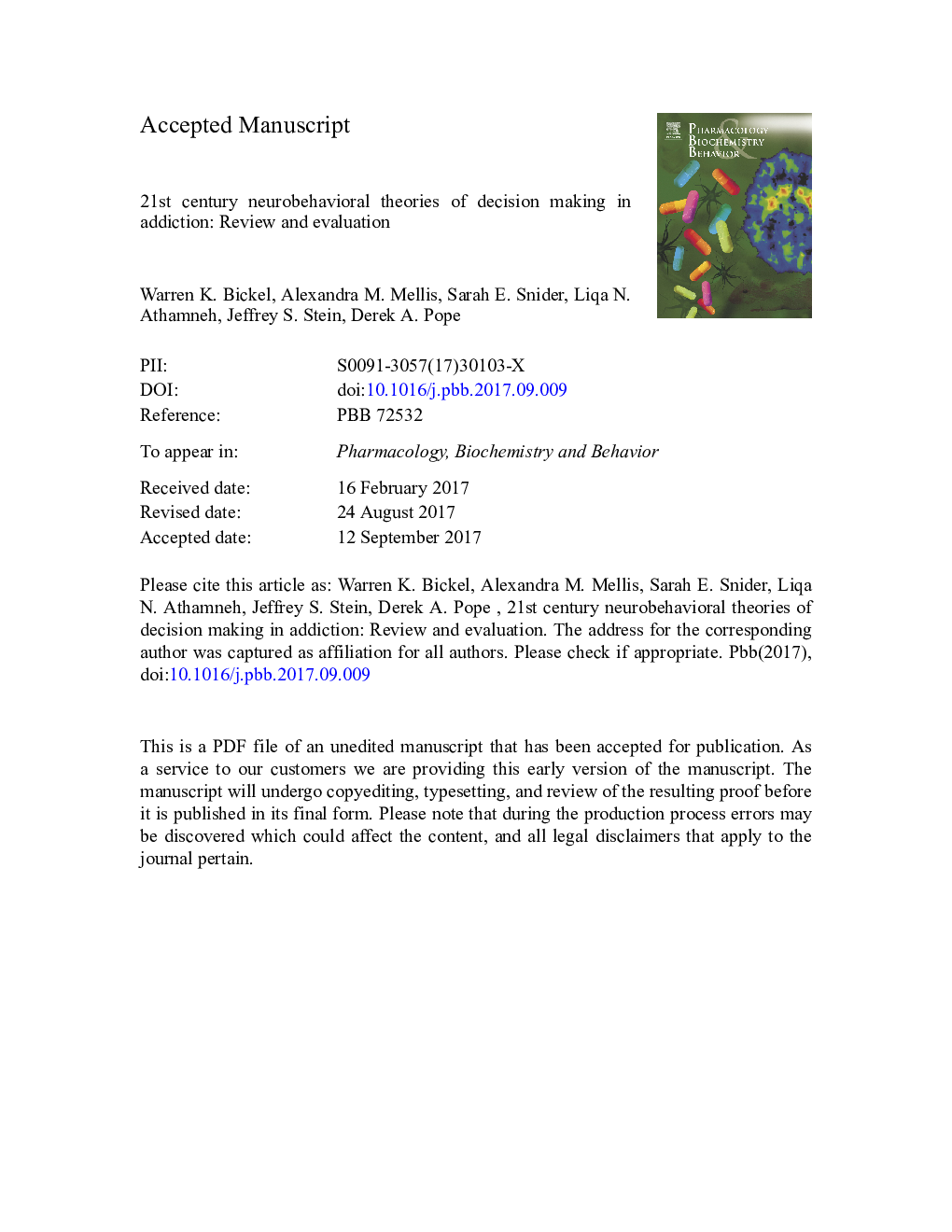| کد مقاله | کد نشریه | سال انتشار | مقاله انگلیسی | نسخه تمام متن |
|---|---|---|---|---|
| 8350068 | 1541823 | 2018 | 73 صفحه PDF | دانلود رایگان |
عنوان انگلیسی مقاله ISI
21st century neurobehavioral theories of decision making in addiction: Review and evaluation
ترجمه فارسی عنوان
نظریه های عصبی رفتاری در قرن 21 تصمیم گیری در اعتیاد: بررسی و ارزیابی
دانلود مقاله + سفارش ترجمه
دانلود مقاله ISI انگلیسی
رایگان برای ایرانیان
کلمات کلیدی
اعتیاد، تصمیم سازی، تئوری، انسان، عصبی رفتاری،
ترجمه چکیده
این بررسی به طور انتقادی از تحولات نظری عصبی رفتاری در تصمیم گیری در اعتیاد در قرن 21 انجام می شود. ما به طور کلی هر تئوری را به هفت معیارهای استقامتی نظری بر اساس توانایی آنها برای پاسخگویی می پردازیم: چرا برخی از کالاها اعتیاد آور هستند؛ روند توسعه در اعتیاد؛ وابسته به وابستگی؛ الگوهای خودپرستانه رفتار در اعتیاد؛ چرا اعتیاد همراه با سایر رفتارهای ناسالم است؟ و در نهایت، به معنی تعمیر اعتیاد است. ما تنها نظریه ها یا فرضیه های خود را که در قرن بیست و یکم توسعه داده شده یا گسترش داده شده اند برای تصمیم گیری در مورد اعتیاد به کار برده ایم. بنابراین ما هفت نظریه متمایز تصمیم گیری در مورد اعتیاد را بررسی می کنیم: نظریه های یادگیری، نظریه انگیزه سازی، انگیزه، عدم تعادل دوپامین و مدل های سیستم، نظریه پردازنده حریف، مدل های قدرت شکست های کنترل خود، نظریه های سیستم تصمیم گیری عصبی رفتاری و نظریه سیستم های سه گانه از اعتیاد در نهایت، ما به طور مستقیم عملکرد هر یک از این نظریه ها را بر اساس معیارهای فوق مقایسه کردیم و نقاط کلیدی را که در آن نظریه های چندگانه جمع شده اند، مشخص کردیم.
موضوعات مرتبط
علوم زیستی و بیوفناوری
بیوشیمی، ژنتیک و زیست شناسی مولکولی
زیست شیمی
چکیده انگلیسی
This review critically examines neurobehavioral theoretical developments in decision making in addiction in the 21st century. We specifically compare each theory reviewed to seven benchmarks of theoretical robustness, based on their ability to address: why some commodities are addictive; developmental trends in addiction; addiction-related anhedonia; self-defeating patterns of behavior in addiction; why addiction co-occurs with other unhealthy behaviors; and, finally, means for the repair of addiction. We have included only self-contained theories or hypotheses which have been developed or extended in the 21st century to address decision making in addiction. We thus review seven distinct theories of decision making in addiction: learning theories, incentive-sensitization theory, dopamine imbalance and systems models, opponent process theory, strength models of self-control failure, the competing neurobehavioral decision systems theory, and the triadic systems theory of addiction. Finally, we have directly compared the performance of each of these theories based on the aforementioned benchmarks, and highlighted key points at which several theories have coalesced.
ناشر
Database: Elsevier - ScienceDirect (ساینس دایرکت)
Journal: Pharmacology Biochemistry and Behavior - Volume 164, January 2018, Pages 4-21
Journal: Pharmacology Biochemistry and Behavior - Volume 164, January 2018, Pages 4-21
نویسندگان
Warren K. Bickel, Alexandra M. Mellis, Sarah E. Snider, Liqa N. Athamneh, Jeffrey S. Stein, Derek A. Pope,
